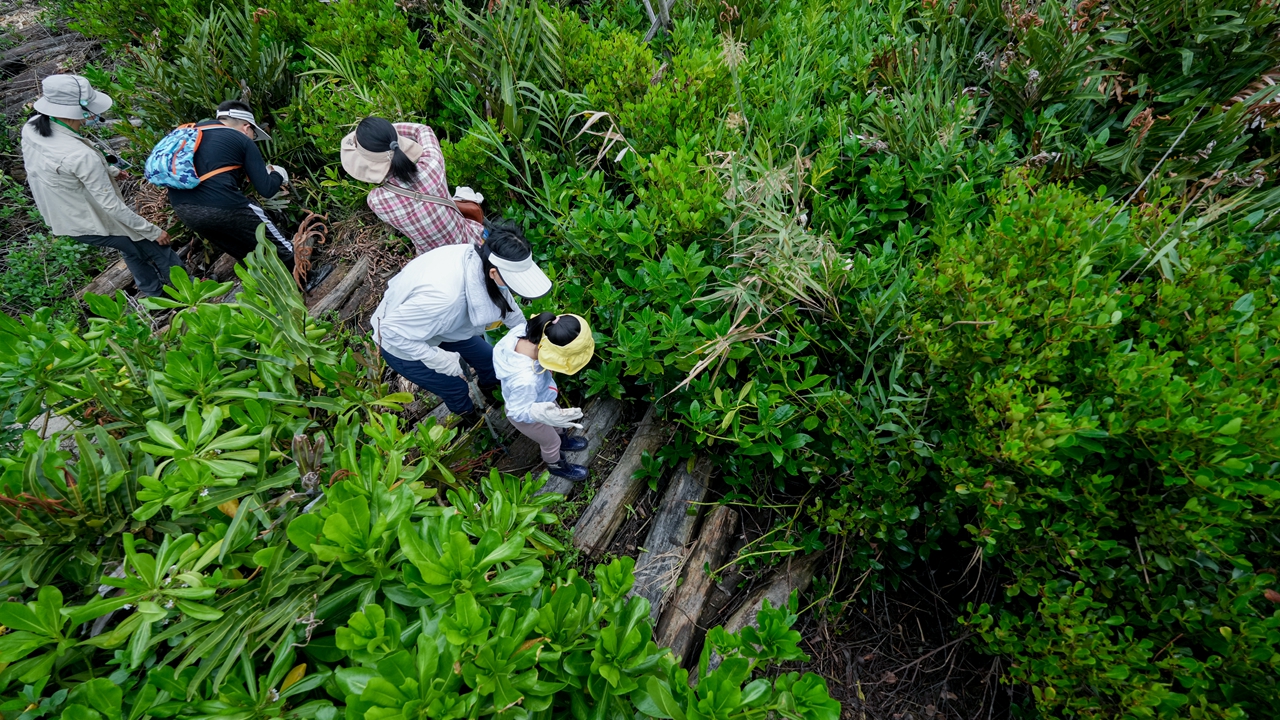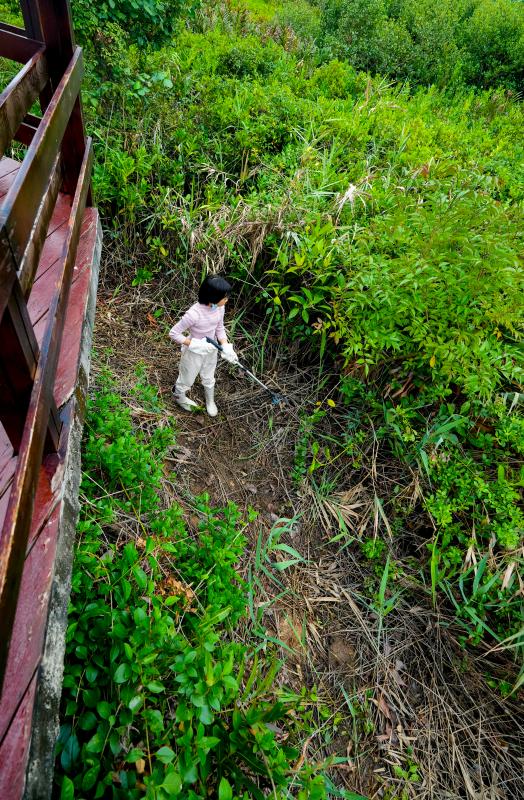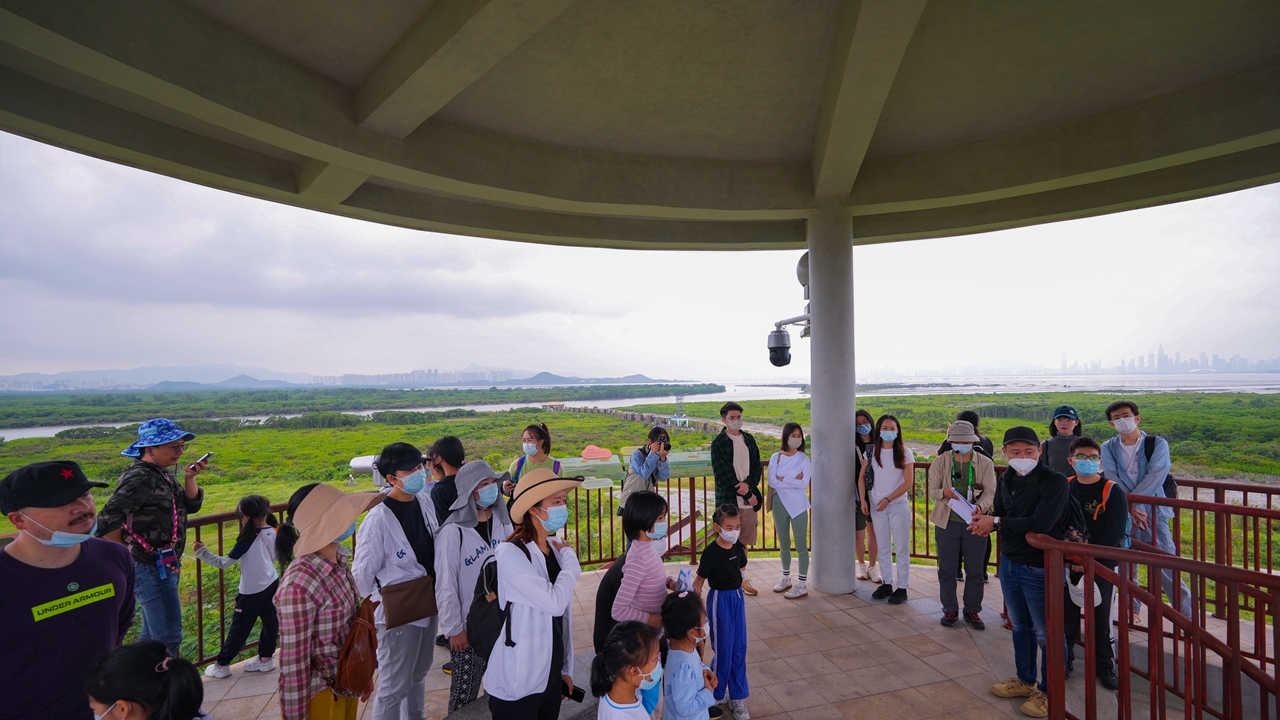We want to foster fans for each key wetland: SZ nature educator
Writer: Wang Jingli | Editor: Zhang Chanwen | From: Shenzhen Daily | Updated: 2022-11-22
A+ A- Print
At a recent global conference for wetlands in Geneva, Switzerland, the idea that cultivating devoted fans for each important wetland is a goal pursued by China’s wetland education has been driven home to every participant by a guest speaker from Shenzhen.
Yan Baohua, secretary-general of Shenzhen Mangrove Wetlands Conservation Foundation (MCF) who has just returned to Shenzhen from the 14th Meeting of the Conference of the Contracting Parties to the Ramsar Convention on Wetlands (COP14) that ended earlier this month, made the point while sharing China’s experience in wetland education at the meeting, according to Shenzhen Evening News yesterday.

Yan Baohua (2nd R) poses for a photo after receiving the Wetland Education Center Star Award given to the Futian Mangrove Ecological Park during the 14th Meeting of the Conference of the Contracting Parties to the Ramsar Convention on Wetlands (COP14) in Geneva, Switzerland, on Nov. 9. Courtesy of the interviewee
Yan, a seasoned nature educator, has been devoted to ecological conservation since she was admitted to the Beijing Forestry University in 1996 as a freshman. A poster she saw of a Yunnan snub-nosed monkey during orientation struck a chord in her heart and prompted her to join the school’s science exploration group.
Yan joined MCF in 2014 after finishing her doctoral degree program on environmental studies in Arizona State University in the U.S. Established in 2012, MCF is China’s first local publicly funded organization that is dedicated to the conservation of coastal wetlands through education, research and conservation efforts.

Residents attend a lecture on wetland protection at the education center of Futian Mangrove Ecological Park in Futian District on Nov. 12. Photos by Liu Xudong unless otherwise stated
Yan’s learning experience in the U.S. made her realize that nature education is a concept waiting to be promoted in the country. She became one of the early promoters of nature education in China.
In 2015, MCF cooperated with seven institutions to conduct a nationwide investigation on the relationship of children living in cities with nature.

Residents help clear garbage off the mangrove forests at Futian Mangrove Ecological Park in Futian during an event organized by Shenzhen Mangrove Wetlands Conservation Foundation on Nov. 12.
The survey suggested that around 68.12% of the correspondents across the country had less than an hour outdoor time each day and 16.33% suffered “nature-deficit disorder,” a concept that describes the phenomena of children and youth becoming disconnected from nature caused by modern society’s rapid development. This has become a serious challenge that threatens not only people’s physical and mental health, but also sustainable development.

A girl picks up garbage at Futian Mangrove Ecological Park on Nov. 12.
The data attracted attention from the Shenzhen government and more efforts have been made to promote professional nature education in the city.
Promoting the establishment of wetland nature education centers has since become MCF’s important mission, Yan said.
MCF has helped establish the Shenzhen Bay Wetland Nature Education Center and China Coastal Wetland Protection Network Nature Education Center.
During the COP14, the organization joined hands with the National Forestry and Grassland Administration and the Society of Entrepreneurs & Ecology (SEE) of Inner Mongolia to launch the China Wetland Centers action plan to further protect wetland education. The plan calls for mass participation worldwide and aims to tap new ways for public participation in wetland protection.

Residents join a tour of Futian Mangrove Ecological Park organized by MCF on Nov. 12.
“We are hoping to take international standards into consideration in building wetland nature education centers and promote wetland education to foster fans for every key wetland,” Yan said.
Since 2015, Shenzhen has established 27 nature education centers, including Fairy Lake Botanical Garden in Luohu District, OCT National Wetland Park and Shenzhen Bay Park in Nanshan District, and Futian Mangrove Ecological Park in Futian District.
Fifteen nature education trails in Shenzhen are now free to the public.
The trails are located in Wutong Mountain National Forest Park and the Orchid Conservation and Research Center of Shenzhen in Luohu District, OCT National Wetland Park in Nanshan District, Guangdong Neilingding Futian National Nature Reserve in Futian District and Dapeng Peninsula National Geopark in Dapeng New Area.
The nature trails are specially developed themed footpaths that convey nature knowledge. They include nature observation trails, nature education corridors, forest and flower walks, birding trails and paths along natural attractions.